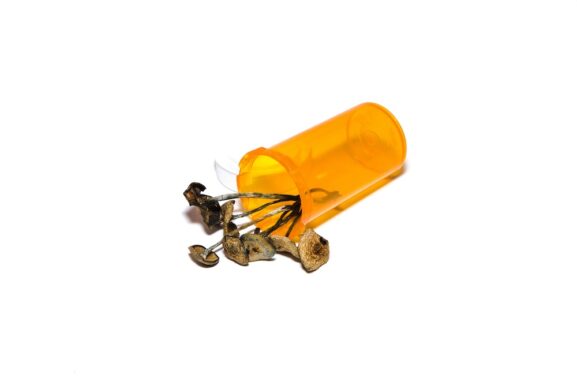Study Reveals Psilocybin Won’t Make You An Atheist, But Might Make You Love Bugs
A recent study conducted by researchers at Johns Hopkins University sheds new light on the effects of psilocybin, a psychedelic substance, on individual beliefs. Contrary to some previous studies, this research indicates that a single psilocybin experience does not typically lead to changes in religious beliefs or perceptions of free will. Interestingly, it does seem to influence how people perceive the consciousness of animals, plants, and even inanimate objects like rocks and robots.
Read more on this story at FilterMag.com
The study, published on May 7 in the Journal of Psychoactive Drugs, involved hundreds of participants who planned to use psilocybin outside of a laboratory setting. Researchers surveyed these individuals about their beliefs before and at two separate intervals after their psilocybin experiences.
New: Interested in Being Part of a Psychedelics-Focused Clinical Trial? Sign Up Here
Participants reported minor changes in their perceptions of consciousness, particularly in attributing consciousness to primates and insects. However, their religious and metaphysical beliefs remained largely unchanged.
“These findings suggest concerns that psychedelics could change metaphysical beliefs or result in ‘conversions’ across religious affiliations may be overestimated,” the researchers noted.
They emphasized that worries about changes in non-naturalistic beliefs or religious affiliations might be exaggerated.
RELATED: Looking for treatment? Find ketamine clinics closest to you as well as other psychedelic therapies in your area.
These findings are crucial for addressing ethical concerns regarding the clinical use of psychedelics. Changes in beliefs during psychedelic-assisted therapy can raise significant bioethical questions. The researchers pointed out that such belief changes could be perceived as personal harm for some patients, potentially affecting their social relationships and raising societal concerns.
Ready to explore a new horizon in mental health? Try out the beta version of HealingChat, HealingMaps AI chatbot that takes all our vetted content, clinics and retreats to answer all your questions in a safe environment. Try the beta version now!
The study also highlights the importance of cautious implementation of psychedelic therapies as they move closer to potential approval for widespread use. The possibility that these therapies could be used to influence individuals’ worldviews underscores the need for careful oversight.
To investigate the effects of psychedelics on beliefs, researchers asked 657 participants questions from three main categories: “Atheist–Believer status,” metaphysical beliefs, and mind perception. Participants were surveyed at the time of consent, two weeks before their planned psilocybin use, two to four weeks after the experience, and again a few months later.
The “Atheist–Believer status” category was straightforward, asking participants to identify as “Non-believer (e.g., atheist),” “Agnostic,” or “Believer (e.g., in Ultimate Reality, Higher Power, and/or God, etc.).” The results showed no change in this category.
Metaphysical beliefs focused on philosophical topics such as materialism, dualism, idealism, and determinism.
Participants rated their agreement with statements like, “Everything that has ever happened had to happen precisely as it did, given what happened before.” The study found little to no changes in this category. Suggesting that concerns about changes in these beliefs may have been overstated.
While there were no significant changes in religious or metaphysical beliefs, the study did find differences in responses around mind perception.
This category measured participants’ beliefs about the consciousness of various entities, including mammals, non-mammal objects/entities, and the universe as a whole.
Participants were asked about statements like, “I am capable of having conscious experience,” “Plants (e.g., trees, flowers) are capable of having conscious experience,” and “The universe is conscious.” The researchers observed significant increases in attributing consciousness to non-human primates, quadrupeds, insects, fungi, plants, and inanimate man-made objects. The largest increases were noted in attributing consciousness to insects.
Some items, such as mind perception of inanimate natural objects (e.g., a rock), inanimate man-made objects (e.g., a robot), and the universe, showed small, statistically significant effects at one time point but not the other.
The authors acknowledged that these findings do not necessarily mean psilocybin never influences users’ metaphysical or religious beliefs. Instead, such changes are not typical after a single experience. They suggested that belief changes might be more likely in specific individuals, depend on particular contextual factors, or require multiple psychedelic experiences over time.
While these findings challenge some earlier research on religious changes associated with psychedelics, they align with previous studies on mind perception. For instance, a 2022 report suggested that people who use psychedelics like psilocybin are generally more connected to nature and knowledgeable about climate change, traits that often translate into pro-environmental behavior.
A 2020 study also found a strong relationship between the amount of lifetime psychedelic use and participants’ reported connection with nature.
As psychedelic therapies, including psilocybin, MDMA, and ketamine, move closer to mainstream acceptance, understanding their impact on beliefs and consciousness remains crucial. This study provides valuable insights into the nuanced effects of psychedelics, emphasizing the need for careful consideration in their clinical application.



